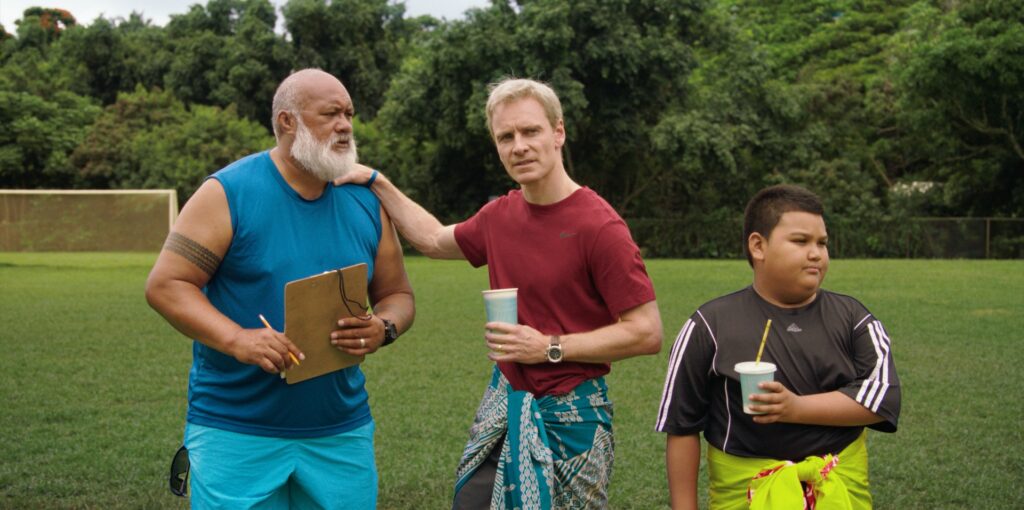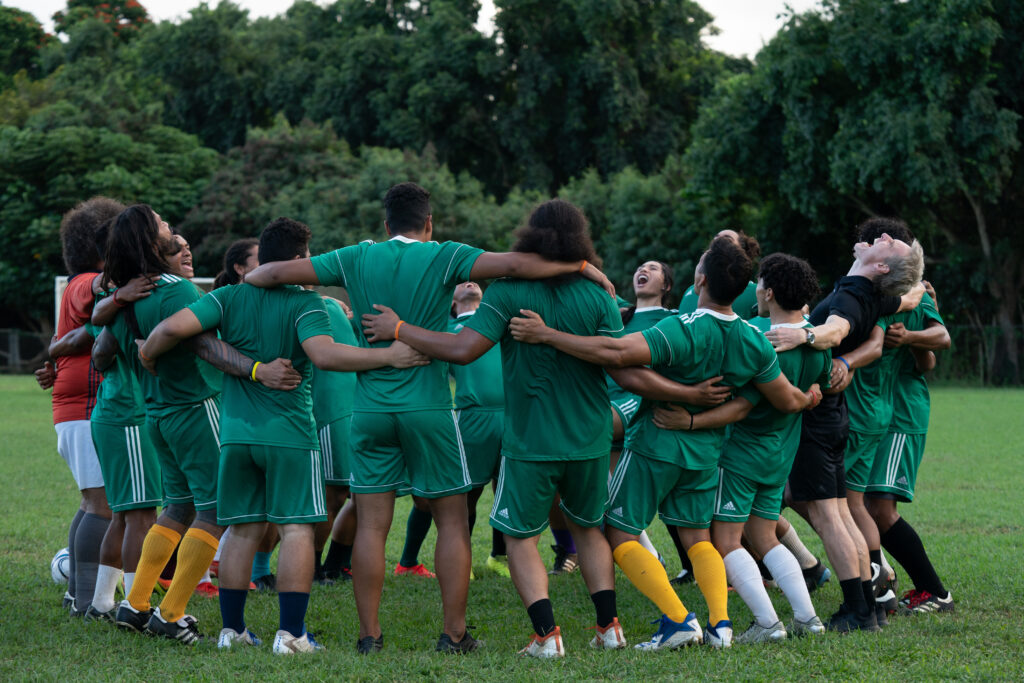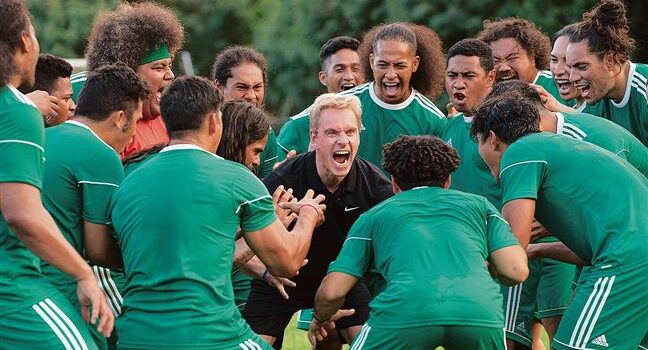By Alex McPherson
A lightweight, enjoyable treat that leans into sports movie cliches while adding some wrinkles, director Taika Waititi’s “Next Goal Wins” doesn’t try to be high art, but succeeds where it counts, and offers a breath of fresh air in our cynical times.
Inspired by the 2014 documentary of the same name, and introduced by a priest played by none other than Waititi himself, the film follows disgraced coach Thomas Rongen (Michael Fassbender) on a journey of personal growth. He’s sent by the American Soccer Federation – led by Alex Magnussen (Will Arnett), who’s dating Rongen’s ex-wife Gail (Elisabeth Moss), also on the Board – to coach the American Samoan national soccer team to FIFA World Cup qualification. It’s really about punishment for his hot-headed behavior and a nudge to “help himself” while floating in career purgatory. When the Board delivers the news to Rongen, he experiences the five stages of grief, explained via a crude PowerPoint presentation by Waititi-regular Rhys Darby.
Unfortunately for Rongen, his newly assigned team doesn’t have the best track record. They infamously lost to Australia 31-0 in a 2001 World Cup qualifying match: the worst defeat in international soccer history. The team lacks drive and organization, rendering Rongen’s assignment quite an uphill battle. The former coach, lovably goofy and earnest Tavita (Oscar Kightley), who works various odd jobs around the island, merely wants Rongen to help the team score one goal. “One goal,” Tavita repeats, as he slowly backs away from Rongen at a beachside restaurant, “One goal.”
It’s all infuriating for the temperamental, alcoholic, and close-minded Rongen – a fish-out-of-water in an unfamiliar culture with traditions and ideals that buck against his hard-assed attitude. In his view, nobody on the team takes soccer, or him, seriously, especially Jaiyah Saelua (Kaimana), a transgender woman whose identity Rongen refuses to accept and respect, while the rest of the team does.
It’s little surprise that Rongen’s hatred gradually fades away as he learns more about American Samoan culture and bonds with the players. Their patience, compassion, and kindness help Rongen conquer his demons and open his heart, which in return helps the team come together and try their best, no matter the outcome, delivering plenty of zany jokes along the way.

Indeed, “Next Goal Wins” follows a familiar template that yields few real surprises. Thanks to strong performances, Waititi’s signature brand of awkward-funny humor, and some emotional moments that (despite their predictability) hit with earnest impact, though, it’s an eminently enjoyable watch. Waititi’s preference for jokes over “dramatic” moments lessens their potency, and the focus on Rongen is less compelling than Jaiyah’s experiences, but “Next Goal Wins” still manages to score that elusive goal, no matter its faults.
Fassbender (coming fresh off his awards-worthy turn in David Fincher’s “The Killer”), fits the gruff, damaged Rongen well – often seeming at odds with the beaming, idiosyncratic people surrounding him on the island. Like Fincher’s nameless hitman, it’s another performance from Fassbender that mocks his character’s “masculine” refusal to be vulnerable and acknowledge his faults, consumed by his work and suffering past trauma to the detriment of everyone around him (except those laughing at his childish behaviors). Rongen’s arc is easy to foresee, but it’s heartwarming, particularly his eventual bond with Jaiyah, the film’s real MVP.
Rongen’s initially awful treatment of Jaiyah is difficult to watch – a scenario that, despite the film’s largely comedic atmosphere, seems plausible and disquieting. It’s thanks to Jaiyah’s refusal to view Rongen in black-and-white absolutes, though, that helps them connect. She won’t write him off or give up her dreams to play soccer. Kaimana brings warmth, pathos, and groundedness to her portrayal, leading to several tear-inducing scenes later on when the empathy she exhibits to others is returned. Her story is inspirational, and the most winning aspect of Waiti’s film.

The rest of the team (including performances from a pitch-perfect David Fane as assistant coach Ace, and Uli Latukefu as former goalie Nicky Salapu, haunted by past failures during the Australia match) aren’t given anywhere near as much depth as Rongen and Jaiyah. Waititi instead paints them in broad strokes – there for pun-filled, pop-culture-heavy punchlines over three-dimensionality.
It’s an unfortunate choice, perhaps due to the film’s 104-minute runtime, which speeds through the story without lingering on gags or otherwise poignant beats. Rongen’s arc notably falls prey to Waititi and Iain Morris’s rushed screenplay – a short heart-to-heart can make him change his tune to an unbelievable, if crowd-pleasing, extent, and a late-movie plot twist with his character is easy to foresee.
This applies to the meat and potatoes of what Rongen and the team are actually doing, too. “Next Goal Wins” is less focused on the game of soccer itself (or the players’ reasons for participating in the first place), and more on the thawing of Rongen’s tough exterior and the formation of community and friendship above all else. Viewers shouldn’t expect many thrilling sequences of last-minute saves and goals. In fact, Waititi seems to actively resent it, shifting attention to relationships and team-building with comparatively small-scale (but important) stakes in the final stretch.
We’re left with an imperfect, tonally inconsistent sports film that aims to put a smile on one’s face and raise awareness of a culture’s, and team’s, continued striving and resilience. On those merits, “Next Goal Wins” wholeheartedly succeeds. It’s no masterpiece (and one yearns for the daring Waititi of “Jojo Rabbit” and “Hunt for the Wilderpeople”), but sometimes films like this are needed, just to restore one’s faith in humanity a little bit more, because every bit counts.

“Next Goal Wins” is a 2023 Sports Comedy directed by Taika Waititi and starring Michael Fassbender, Elisabeth Moss, Will Arnett, Oscar Kightley, Kaimana, and David Fane. It’s rated: PG-13 for some strong language and crude material and runs 1 hour, 43 minutes. It opened in theatres Nov. 17. Alex’s Grade: B.
Alex McPherson is an unabashed pop culture nerd and a member of the St. Louis Film Critics Association.




